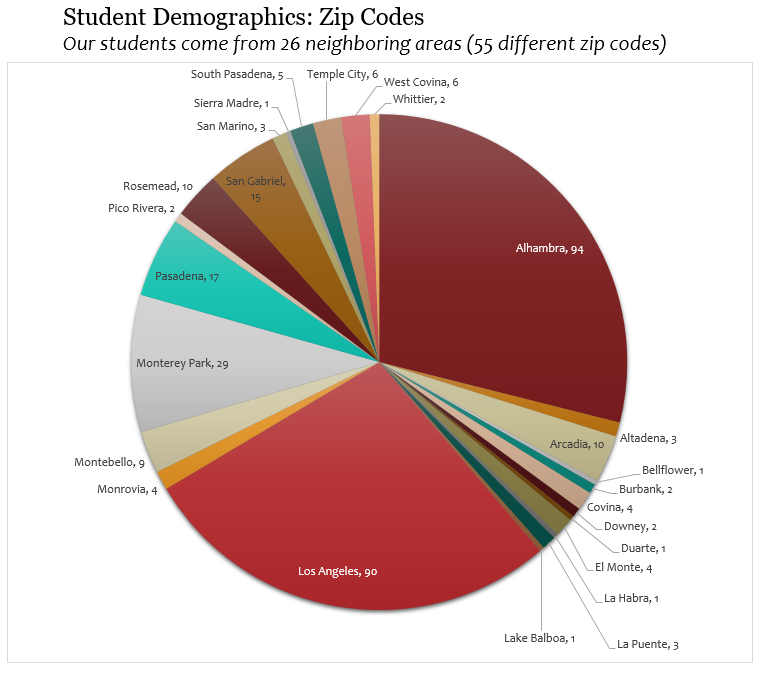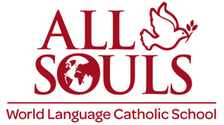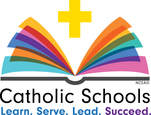Do we need to live in Alhambra to attend All Souls?
No, you do not need to live in Alhambra to attend All Souls. We have students from 60 different zip codes!
Do we have to be Catholic?
All are welcome at All Souls World Language Catholic School. We serve a diverse community and you do not need to be Catholic / Christian to attend the school. With that said, we do honor the Catholic tradition. Each day begins and ends with prayer. A blessing is also said before meals. Students learn to pray in both English and Spanish or Mandarin. Religion is taught everyday in a welcoming and inclusive manner. Our school community celebrate Mass together at least once a month during the school year and all students have the opportunity to participate in the readings, petitions, and songs. You and your child are welcome to worship with us! Additionally, we offer sacramental preparation for Baptism and First Communion for interested families. If you would like to learn more about Catholic Schools and Catholic education, we encourage you to visit http://lacatholicschools.org/
What is dual language immersion?
Two-Way Immersion is a type of dual language education in which two languages are used for instruction: English and a partner language. TWI programs use a variety of models, but they all provide instruction in the partner language for a significant portion of the school day. Students learn both academic content and literacy in English and a partner language. Lessons are not repeated in one language after the other, but skills and knowledge taught in one language are reinforced in the other language through thematic teaching and attention to cross-linguistic development. Two-way immersion programs strive to promote bilingualism and biliteracy, grade-level academic achievement, and positive cross-cultural attitudes and behaviors in all students.
What if I don't know the language?
One of the main concerns for parents in a dual language immersion program is how will I be able to help my child if I don’t know the language? One way that we plan on addressing this concern is that teachers will send a newsletter regarding overarching topics students will be viewing in class. This will include items that will help you engage your child in conversations and ask questions. However, a large part of enrolling in this program is being confident that your child will learn independently of you. Encourage your child to go to class a couple of minutes before school to ask the teacher for help. If they are too young or shy accompany them to ask the teacher for help, eventually they will be asking without your help. This will guide them into becoming independent learners and empower them to take charge of their learning. Also, use other parents in your child’s class as a resource.
What language should I speak to my child in at home?
Speak to your child in the language you feel most comfortable in and read, read, read in that language. Research from the National Literacy Panel and the Center for Research, Education, Diversity and Excellence suggest that students learn their second language best when they have strong literacy skills in their native language. That means that by helping them with their English, you are indeed helping them with their Spanish or Mandarin and vice versa!
How soon will my child be able to read, write, and speak in Spanish/English or Mandarin/English?
Success in dual language education requires commitment to the program. Professor Jim Cummins from the University of Toronto makes two distinctions in language proficiency: Basic Interpersonal Communication Skills (BICS) and Cognitive Academic Language Proficiency (CALP). BICS is the “surface” skills of listening and speaking a language. It is also known as the "social language skills". People can acquire BICS in two to three years. It is the day-to-day language needed to interact socially with other people (playing on the playground, in the lunch room,on the school bus, at parties, playing sports, etc). CALP, on the other hand, shows one’s ability to cope with the academic demands placed upon him/her in the various subjects. CALP usually takes five to seven years. This includes listening, speaking, reading, fluency, comprehension, and writing about subject area content material. CALP includes skills like comparing and contrasting, classifying, synthesizing, evaluating, and interfering.
Will my child be prepared for high school? Will my child be able to perform well at standardized testings? Will my child fall behind in English?
Both native English speakers and native speakers of the partner language tend to do as well or better in English, the partner language, and tests of academic achievement than their peers in other educational programs.
Resources
- Two Way Immersion: The Basics
- Collier, V. P., & Thomas, W. P. (2004). The Astounding Effectiveness of Dual Language Education for All. NABE Journal of Research and Practice, 2(1), 1-20.
- Howard, E. R., Christian, D., & Genesee, F. (2003). The Development of Bilingualism and Biliteracy from Grades 3 to 5: A Summary of Findings from the CAL/CREDE Study of Two-Way Immersion Education. Santa Cruz, CA and Washington, DC: Center for Research on Education, Diversity & Excellence.
- Howard, E. R., Sugarman, J., & Christian, D. (2003). Trends in Two-Way Immersion Education: A Review of the Research (Report No. 63). Baltimore, MD: Center for Research on the Education of Students Placed At Risk.
- Lindholm-Leary, K. (2001). Dual Language Education. Clevedon: Multilingual Matters.
- Lindholm-Leary, K., & Block, N. (2010). Achievement in predominantly low SES/Hispanic dual language schools.International Journal of Bilingual Education and Bilingualism, 13(1), 43-60.
- Lindholm-Leary, K. J., & Howard, E. R. (2008). Language development and academic achievement in two-way immersion programs. In T. W. Fortune & D. J. Tedick (Eds.), Pathways to Multilingualism: Evolving Perspectives on Immersion Education(pp. 177-200). Oxford, UK: Blackwell.
- Thomas, W. P., & Collier, V. (2002). A National Study of School Effectiveness for Language Minority Students' Long-Term Academic Achievement. Santa Cruz, CA and Washington, DC: Center for Research on Education, Diversity & Excellence.





